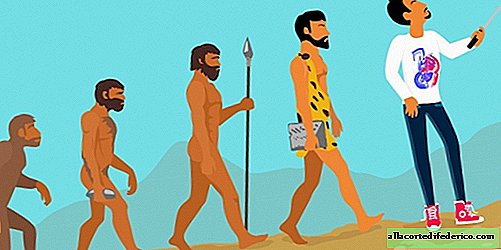We are getting fat, getting smarter and losing teeth: in what direction is the evolution of man
Over the long millennia of evolution, man has gone from ape-like ancestors to upright Homo Sapiens with a developed intellect, emotions and a complex set of social connections. But the development of man did not end there, according to scientists. We continue to change, and some recently acquired qualities can hardly be called useful for our body.

Analyzing the evolutionary changes occurring with a reasonable person, scientists have compiled a list of recent major acquisitions. Studies show that evolution follows the path of acquiring various mutations, while the influence of natural selection is gradually decreasing. We suggest you familiarize yourself with a curious list.
The brain has become smaller but more effective

The brain of Homo sapiens has a larger volume than, for example, the brain of Australopithecus. But, as scientists note, about 10,000 years ago, evolution took the path of decreasing brain mass in relation to body weight. It is all about the greater effectiveness of this human organ. At the same time, many researchers have noted some degradation of the brain over the past several thousand years. So, for example, the geneticist Herald Crabtree from Stanford University, believes that with the advent of large communities of people and a social hierarchy several thousand years ago, the human brain began to degrade intellectually and emotionally. Although this theory has many opponents, there is some evidence for this process.
Increased average weight and diabetes

According to the researchers, a decrease in physical activity led to negative changes in the human body. Over the past century, the average weight of a person has increased, a number of diseases have appeared that are also associated with changes in nutrition. A sedentary lifestyle and excessive consumption of sugary and high-calorie foods have led to the widespread spread of type 2 diabetes.
Increased immunity

The increase in the number of people and relocation to cities contributed to the widespread spread of infectious diseases. Large-scale epidemics have led to the deaths of thousands of people more than once. In response to this, the human body has developed a number of measures designed to increase immunity and increase the chances of survival. According to the researchers, modern man is much more resistant to infectious diseases than our ancestors only 200-300 years ago.
We have lost wisdom teeth

Human teeth over the past millennia have also undergone a number of changes. Studies show that already more than 30% of our contemporaries do not have wisdom teeth, that is, instead of 32 teeth, they have only 28. They simply became not needed by people. At the dawn of evolution, when a person ate coarse plant and animal food, his teeth quickly wore out and they were replaced by a new set. As a result of a change in the type of nutrition in a person, wisdom teeth began to grow all later, and according to the emerging trend, they would soon disappear altogether.
Blue-eyed people appeared

As scientists were able to find out, only 6-10 thousand years ago, blue-eyed people did not exist. Appearing as a result of an accidental mutation in the Black Sea region, blue eye color began to spread rapidly. Apparently, blue-eyed people were popular with the opposite sex and had a higher chance of leaving offspring. Therefore, today around 500 million blue-eyed people live on the globe.
The nose is not the same

Our sense of smell has been significantly affected during the evolutionary process. As in the case of teeth, the need to distinguish a large number of odors has disappeared over time. Less communication with the natural world and varied smells made our sense of smell more primitive.
Disease resistance at the genetic level

People living in the northern latitudes are incredibly lucky: there are no pathogens of malaria. But a significant number of people living on the planet are concentrated in tropical countries where hundreds of thousands of people die from malaria every year. However, evolution found a way out: as a result of a mutation, genes responsible for the immunity of humans to malaria appeared. In addition, experts note the appearance of similar genes for tuberculosis and leprosy.
Genetic Lactose Tolerance

This interesting evolutionary acquisition is associated with the domestication of cattle. A few thousand years ago, people ate milk only in infancy, and with age they lost the ability to digest this product. Today, in many regions of the world where the domestication of animals and the consumption of their milk lasts more than one thousand years, people have a tolerance to the breakdown of milk sugar - lactose. This feature allows you to eat milk at a more mature age without harming the body and is inherited. The largest percentage of genetically tolerant people to lactose is observed today in Europe.

















